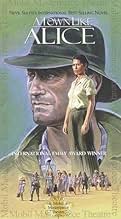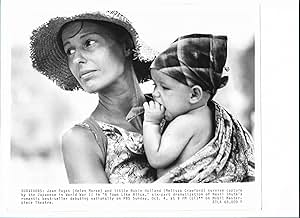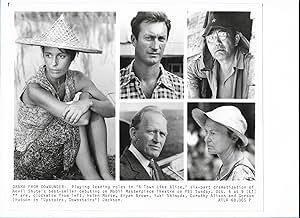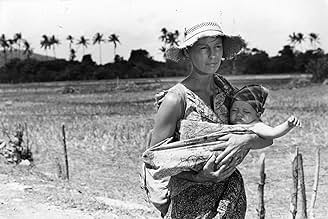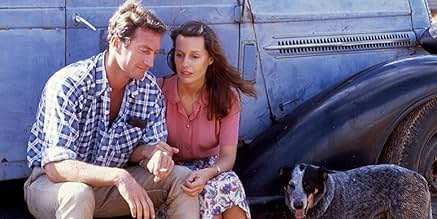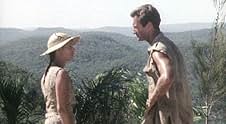A Town Like Alice
- TV Mini Series
- 1981
- 5h 1m
IMDb RATING
8.3/10
1.1K
YOUR RATING
Set against the brutal chaos of World War II, a love story begins that will take two lovers through a living nightmare of captivity, across three continents and two decades.Set against the brutal chaos of World War II, a love story begins that will take two lovers through a living nightmare of captivity, across three continents and two decades.Set against the brutal chaos of World War II, a love story begins that will take two lovers through a living nightmare of captivity, across three continents and two decades.
- Nominated for 1 Primetime Emmy
- 8 wins & 1 nomination total
Browse episodes
Featured reviews
Helen Morse (`Picnic at Hanging Rock'; `Caddie') delivers a notable performance as the graceful and determined quiet English woman with a thoroughly convincing strength of character, able to withstand the trauma of the Malayan trek and the challenges of a cross-cultural relationship in an environment alien to her. Although in many ways it is disappointing not to have seen Morse develop her promising film career beyond the following year's `Far East', for the past twenty years she has chosen to concentrate her prodigious talents on the Australian theatre instead where she finds the roles both challenging and fulfilling, something she suspects would not be available from current films. I find the comparisons others have made to Sigourney Weaver particularly significant as Morse gave by all accounts a harrowing portrayal of Paulina in `Death and the Maiden' for the Sydney stage to rank alongside her screen counterparts haunting rendition a year later in 1994. Curiously, they also both starred in Australian productions of Asia based `Casablanca' remakes released within months of each other in 1982; Weaver as Mel Gibson's love interest in Peter Weir's `The Year of Living Dangerously' and Morse as the prurient wife of a crusading journalist in John Duigan's `Far East'. Morse's recent outing as Theodora Goodman in Patrick White's difficult, both in adaptation and performance terms, `The Aunt's Story', which tells of her migration from dusty Australia to the relative calm of America via the maelstrom of Europe on the brink of the Second World War, has already received critical acclaim in Melbourne, Sydney and Brisbane. Though ably cast as Joe Harman, Leonard Maltin writing in 1994 believed that Bryan Brown has a likeability that had not been sufficiently tapped by the parts he had taken up till then, which included the romantic lead in `Gorillas in the Mist' also with Sigourney Weaver. His more recent Australian work in `Two Hands' (made in 1999 and ranked among Empire magazine's movie buffs top ten local films, though rather obviously heavily influenced by Tarantino's `Pulp Fiction') suitably cast Brown as a Sydney mobster boss with an unusual degree of compassion, providing along with the intensely black humoured heist the high spots of the film in an uneven mix of comedy and tragedy. Brown has also turned his hand to producing and last year returned from Hollywood to make local Australian films such as the gangster flick `Dirty Deeds' in which he took a starring role, and was released in the UK this summer.
Tragically, Arkie Whiteley who played the young barmaid Annie, died from cancer at the end of 2001 at the far too early age of 37. She was the daughter of the renowned painter Brett Whiteley, the subject of the original David Williamson play `Up for Grabs' which last year enjoyed a run in London's West End with the pop-goddess Madonna, before he and Australia, at the star's insistence, were unjustly usurped by Jackson Polock and America for an international audience. Whiteley's painting `Arkie Under The Shower' has come home ten years after the actress sold it, and it fetched $810,000 at auction in Sydney this August. Arkie was memorably the beauty against a backdrop of beasts in the squalid horror of `Razorback' before she made a successful career on the London stage, as well as appearing in TV productions in the UK such as `The Last Musketeer' in 2000. Also for the keen-eyed viewer, Anne Haddy can be spotted in a minor role as Aggie Topp, Jean's English friend who is brought to Australia to help out in her venture. Haddy, as I am sure we all know, went on to become as Helen Daniels the much loved and long serving matriarch of `Neighbours', that phenomenal export to the UK, before her life long battle with ill health was sadly lost in 1999.
Inspiration for Nevil Shute, came from the true story of 80 Dutch women and children who spent 2½ years walking around the island of Sumatra, although less than 30 survived the ordeal. The invasion of Malaya in 1942 also saw the forced march of legions of civilians fleeing the marauding army with many perishing en route. Incidentally the author spent the remainder of his years in Australia after researching for his novel `On the Beach' in which he depicts a nuclear holocaust in the Northern Hemisphere engulfing all life except for a few survivors in the Antipodean continent. The novel was published just three years before the 1962 Cuban Missile Crisis that culminated in the critical Black Saturday on 27 October. Fortunately for us all, sanity just about prevailed as Kennedy and Khrushchev climbed down from the brink of a catastrophic nuclear strike, as was revealed in last year's BBC Radio 4 documentary commemorating the 40-year anniversary, and in a further BBC4 programme screened a few weeks ago.
The TV mini-series faithfully follows the original novel, and though at times at the same plodding pedestrian pace it still makes for a splendid love story set against the brutality of the Japanese occupation in Asia and the toughness of the Australian outback. It is a fine tribute to those essential qualities of human endeavour, courage and determination in overcoming life's obstacles in order to achieve personal dreams.
Although ScreenSound Australia holds a master video it is not permitted to sell the film overseas, however NTSC versions can be obtained via Amazon's website.
Tragically, Arkie Whiteley who played the young barmaid Annie, died from cancer at the end of 2001 at the far too early age of 37. She was the daughter of the renowned painter Brett Whiteley, the subject of the original David Williamson play `Up for Grabs' which last year enjoyed a run in London's West End with the pop-goddess Madonna, before he and Australia, at the star's insistence, were unjustly usurped by Jackson Polock and America for an international audience. Whiteley's painting `Arkie Under The Shower' has come home ten years after the actress sold it, and it fetched $810,000 at auction in Sydney this August. Arkie was memorably the beauty against a backdrop of beasts in the squalid horror of `Razorback' before she made a successful career on the London stage, as well as appearing in TV productions in the UK such as `The Last Musketeer' in 2000. Also for the keen-eyed viewer, Anne Haddy can be spotted in a minor role as Aggie Topp, Jean's English friend who is brought to Australia to help out in her venture. Haddy, as I am sure we all know, went on to become as Helen Daniels the much loved and long serving matriarch of `Neighbours', that phenomenal export to the UK, before her life long battle with ill health was sadly lost in 1999.
Inspiration for Nevil Shute, came from the true story of 80 Dutch women and children who spent 2½ years walking around the island of Sumatra, although less than 30 survived the ordeal. The invasion of Malaya in 1942 also saw the forced march of legions of civilians fleeing the marauding army with many perishing en route. Incidentally the author spent the remainder of his years in Australia after researching for his novel `On the Beach' in which he depicts a nuclear holocaust in the Northern Hemisphere engulfing all life except for a few survivors in the Antipodean continent. The novel was published just three years before the 1962 Cuban Missile Crisis that culminated in the critical Black Saturday on 27 October. Fortunately for us all, sanity just about prevailed as Kennedy and Khrushchev climbed down from the brink of a catastrophic nuclear strike, as was revealed in last year's BBC Radio 4 documentary commemorating the 40-year anniversary, and in a further BBC4 programme screened a few weeks ago.
The TV mini-series faithfully follows the original novel, and though at times at the same plodding pedestrian pace it still makes for a splendid love story set against the brutality of the Japanese occupation in Asia and the toughness of the Australian outback. It is a fine tribute to those essential qualities of human endeavour, courage and determination in overcoming life's obstacles in order to achieve personal dreams.
Although ScreenSound Australia holds a master video it is not permitted to sell the film overseas, however NTSC versions can be obtained via Amazon's website.
Beautifully filmed, it tells the story of the book in wonderful detail. Conveys the courage of the heroine against horrible conditions in Malaya and her commitment to the virtue of productivity in turning a decrepit Outback village into a thriving "town like Alice (Springs)". No environmentalist her, she's definitely pro-development. The only downside, rather minor, is the injection of a gratuitous (and out-of-character) conflict between the two leads. Also captures the spirit of the Outback and inspires one to visit it (as it inspired me to visit Alice Springs and a Queensland cattle station).
I have seen this film at least 100 times and I am still excited by it, the acting is perfect and the romance between Joe and Jean keeps me on the edge of my seat, plus I still think Bryan Brown is the tops. Brilliant Film.
I raced to the library to check out this miniseries after having just finished listening to the marvelous "talking books" unabridged version of the book. The first half of this TV version is really very good, but it stumbles quite a bit in the second half. The relationship with the trustee is overplayed and conflicts are inserted between Jean and Joe that don't exist in Shute's story, unwisely in my opinion, as they greatly diminish the power of their love story. I was disappointed to find that the wonderful Bryan Brown's Joe seemed a lot cockier and much less appealing than the man in the book, but Helen Morse's Jean was really quite good. I think they would have had to make this a 10-hour miniseries to develop the outback story properly. But all that said, I did watch whole thing in more or less one go and did appreciate its merits, all the while wishing that someone would do a less soapy remake.
I first saw the series on Msterpiece Theater on PBS in weekly hourly installments tgat went for about 14 or 15 weeks in the 70's. If there was a movie from that, that's too bad because the entire series had to be viewed in its entirety with the detail that 14 or 15 hors of plot give. The theatrical movie version that was done in the 50's with Peter Finch doesn't do justice to the story. The plot divided into two parts...1)the World War II agony of the trek through the jungle and stay in a prisoner of war camp and 2) the relationship that develops in the Outback of Australia. One of the most vibrant scenes I recall was the character Paget being elated that Harmon was, in fact alive, skipping and jumping for joy down the beach after having thought he died years previously. Wonderfully filmed throughout the series.
Did you know
- TriviaThis was the first non-British production to air in the U.S. on Masterpiece Theatre (1971).
- GoofsAlthough set in 1948, Jean Paget boards a Routemaster London bus. Routemasters weren't introduced until the mid-1950s.
- ConnectionsFeatured in The 34th Annual Primetime Emmy Awards (1982)
- How many seasons does A Town Like Alice have?Powered by Alexa
Details
- Release date
- Country of origin
- Language
- Also known as
- Der lange Weg nach Alice Springs
- Filming locations
- Production companies
- See more company credits at IMDbPro
Contribute to this page
Suggest an edit or add missing content



